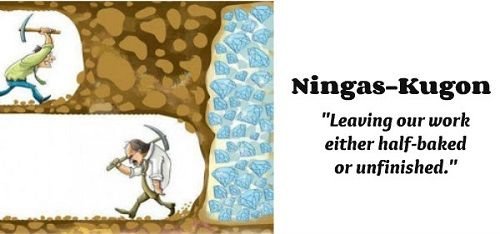Bahala na Attitude (“come what may”)
This attitude, while not inherently detrimental in itself, is still a double-edged sword. On one hand, positive aspects of this behavior include belief in Divine Providence and national social responsibility. On the other hand, the attitude can also promote a sense of helplessness and resignation of one’s fate at the local level, and a countrywide lack of empathy and collective action on the national level. This is also the reason why we tend to have amnesia over past wrongdoings committed by our leaders.

Crab Mentality.
Simply put, this refers to the behavior of preventing someone from achieving something due to jealousy or envy. Instead of praising or rendering assistance, someone with crab mentality would think “if I can’t have it, then you can’t as well” and will purposely try to bring his/her victim down. And just like the crabs who could have escaped from the bucket if they only stopped pulling each other down, nothing ever gets accomplished.

Ningas-Kugon.
One reason why we sometimes exert half-hearted effort in our undertakings is due to this attitude. Translated to “burning cogon grass” in English, this idiom is meant to illustrate how Filipinos initially exhibit great enthusiasm at the beginning of a project. Our eagerness however, fades away just as quickly as the fire is extinguished, leaving our work either half-baked or unfinished.

Mañana Habit.
It is ironic that the Spanish would accuse Filipinos of being lazy when they themselves taught us the mañana habit in the first place. Known as “tomorrow” in English, the habit encourages procrastination, an “ability” we Filipinos have since turned into an art form. Even the most urgent of projects and tasks can be relegated for some other time; we are only forced to work on them when the deadline is near. It’s a miracle we get things done in this country.
.jpg)
Filipino Time.
Related to the mañana habit, Filipino time refers to the Filipinos’ own unique brand of time, which is known to be minutes or hours behind the standard time. In other words, we tend not to observe punctuality at all. This behavior usually drives time-observant foreigners crazy. While we Filipinos with our easy-going ways have somewhat become used to Filipino time, it still is a bad habit that needs to be dropped.

Being Onion-Skinned (Balat Sibuyas).
We Filipinos are famous for being onion-skinned or easily slighted at perceived insults. While it’s perfectly normal for us to taunt and criticize others, we can’t handle the same when it’s being hurled back at us. Incidents showcasing our extra-sensitivity to insults usually involve a foreigner making either a bonafide racist remark or a humorous jab at us Filipinos. True to form, our reactions would range from righteous indignation to excessive grandstanding. While it is alright to feel incensed, throwing a fit in front of the world would inevitably do us no good at all.

Balikbayan Box Mentality.
While there is nothing wrong with giving gifts to one’s family and friends (we Filipinos do highly value them after all), it becomes a different matter when said family and friends either misconstrue or abuse the OFW’s generosity.
In local parlance, this has become known as the “Balikbayan box mentality.” People ingrained with this mentality either become exploitative or jealous of the success of the OFW, not knowing that he/she is working hard away from his loved ones in a foreign country. Some also believe that the practice undoubtedly contributes to the Filipinos’ colonial mentality.

Instead of Bahala na si Batman...
Surrender everything to God.
so true.
I hope that reaches more people